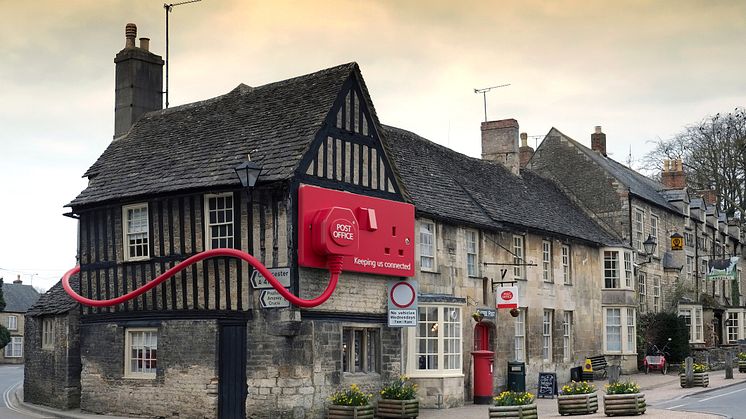
Press release -
Risk of post office closures from spiralling energy bills could cost the UK economy billions if Government ends its support
- Energy bills for the average post office have jumped 249% – and are set to rise by £6,000-£8,000 next year - putting these community hubs and the essential services they provide at risk of closure
- New research from London Economics reveals that Post Office Ltd. and its 11,500 branches contribute nearly £5 billion to the UK economy per year – but this contribution is under threat if post offices cannot afford to pay spiralling energy costs
- Post Office calls on the Government to continue to support them by extending the Energy Bill Relief Scheme for its branches beyond 31 March 2023
As cost-of-living pressures worsen, thousands of post offices face a struggle to stay open if the Government does not extend its current support on energy bills beyond the end of March 2023.
As energy costs soar, typical post office energy bills have gone up by 249% and are set to rise by a minimum of £6,000-£8,000 next year, if the current support stops in March. This will put extreme pressure on the local Postmasters who run post offices across the country, with the real risk of having to close. This would leave local people and businesses out in the cold and without access to the essential services they rely on.
Furthermore, new research by London Economics has revealed the huge impact the Post Office network has on supporting the British economy and jobs. With an economic impact larger than Heathrow Airport, the Post Office and its branches deliver £4.7 billion every year to the UK – an enormous figure that risks being overlooked in the Government’s review of its support scheme. The research finds that post office branches play a significant role in supporting other livelihoods in the area, with visits to post offices generating over £3 billion a year of spending in nearby shops and businesses, helping keep local high streets alive.
At the same time, millions of people across the country also rely on their community post office to access the support the Government is already making available to them towards monthly energy bills. Between October 2022 and March 2023, post offices are expected to issue around 7.8 million Energy Bill Support Scheme (EBSS) vouchers to 1.3 million pre-pay energy customers – a vital lifeline for those who are being most impacted by the energy crisis.
Post office closures would be particularly harmful for rural communities, where over a quarter of post offices are considered the last shop in the village and the only accessible option for people to receive government support. It would hurt the most vulnerable in society, including those on low incomes and the elderly who view the post office as a hub where they can come socialise and get daily support and advice.
To date, the Energy Bill Relief Scheme (EBRS) has helped cap the increase in energy bills for post offices, which has been a lifeline for thousands of Postmasters. The Government is now reviewing the scheme to determine which businesses are most vulnerable and merit continued support, with a decision expected by the end of December.
Nick Read, Chief Executive, Post Office said: "With over 11,500 branches across all four nations of the UK, post offices are catalysts for social but also economic activity. Together we generate almost £5bn in economic impact nationwide, supporting businesses of all sizes, thousands of jobs and delivering vital services. But our Postmasters are not immune to the profound cost-of-living crisis and escalating energy bills, and they need help to survive this winter and beyond. Government should not overlook the important role they play in the economy and in keeping us all connected – both nationally and in every local community across the country – and we strongly urge them to extend the Energy Bill Relief Scheme support in place for post offices beyond 31 March 2023.”
Local Postmasters express concerns
Postmasters across the country are struggling to cover their energy bills already and will be pushed further to the brink as energy prices continue to rise if government support ends.
Postmaster of Blackpool and Whalley post offices, Azim Shaikh, is like thousands of other small business owners running Post Office branches. He stayed open throughout the pandemic lockdowns to ensure his community could keep connected with his essential services like withdrawing cash, paying bills and sending post. Now, he is committed to continuing keeping his doors open again so his community can continue to access vital services, including government pay-outs that many people, particularly the most vulnerable in his community, rely upon.
Azim’s dedication to keep going despite his energy bills doubling in the past few months, which have stretched his business thin, is just one example of Postmasters’ commitment to their communities, and it is a reflection of what is happening across the UK. Without an extension of the Government’s energy support, Azim’s post offices will be at risk of closure.
Azim Shaikh, Blackpool and Whalley Postmaster, comments: “Our post offices are a lifeline for the local communities we serve, keeping businesses and people connected. Every single day people come through my doors looking for a friendly face, a chat, or help with everything from accessing cash, paying bills, topping up electricity and gas meters, and sending packages to loved ones. My energy bills have doubled in the past few months and I’m now struggling to pay staff wages – we need the Government to do more to help support us by extending its energy support to help keep us alive.”

After visiting Azim’s Blackpool Post Office branch last week, Scott Benton MP, Blackpool South said:
“It was great to visit my local post office in Blackpool, where I saw first-hand the amazing work that Azim, like many postmasters across the country, do for the local community. Post offices will be vital to thousands of customers over the winter who rely on its essential services but it is clear that post offices need our support too. Branches, like Azim’s, contribute so much to the national and regional economies and we are all grateful for the service of postmasters here in Blackpool, and across the UK.”
-[ENDS]-
Notes to editors
Methodology for London Economics data
The economic modelling of the direct, indirect and induced impact considers the impact that Post Office’s expenditure and employment had on the United Kingdom in the financial year 2021-22. Post Office’s direct impact in terms of expenditure and FTE jobs supported was calculated using a combination of internal Post Office data provided to London Economics and an online survey of Postmasters that was undertaken by London Economics.
The expenditure of Post Office was calculated separately for the branch network and Post Office Limited
Key London Economics data
- Post Office Ltd and its network of branches generate an economic impact bigger than that of the Heathrow Airport at £4.7 billion but with Postmasters struggling to keep their doors open they are calling for Government support.
- Visits to post offices generate over £3 billion a year of spending in nearby shops and businesses.
- Post Office Ltd. and branches also support 50,000 full-time jobs across the United Kingdom
- Over a quarter of post offices are considered “the last shop in their village.”
Categories
About the Post Office
- With over 11,500 branches, Post Office has the biggest retail network in the UK, with more branches than all the banks and building societies combined.
- Post Office is helping anyone who wants cash to get it whichever way is most convenient. Partnership with over 30 banks, building societies and credit unions means that 99% of UK bank customers can access their accounts at their Post Office.
- Cash withdrawals, deposits and balance enquiries can be made securely and conveniently over the counter at any Post Office; and the biggest investment by any organisation or company in the last decade is being made to safeguard 1,400 free-to-use ATMs across the UK.
- Post Office is simplifying its proposition for Postmasters with a focus on itscash and banking; mails and parcels; foreign exchange; andbill paymentsservices.
- Researchhas found that visits to the Post Office help drive another 400 million visitors to other shops, restaurants and local businesses equating to an estimated £1.1 billion in additional revenue for High Street businesses.
- 99.7% of the population live within three miles of a Post Office; and 4,000 branches are open seven days a week.





